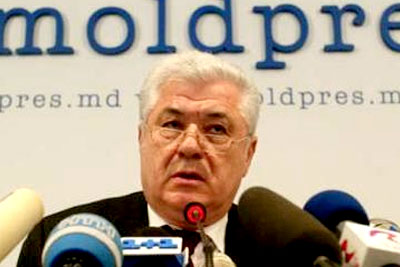
OFFICIAL CHISINAU SEEKS RECOGNITION OF MOLDOVAN ETHNICITY AND MINORITY IN ROMANIA
Publication: Eurasia Daily Monitor Volume: 4 Issue: 40
By:

Conflicting views on national and linguistic identity and history, marring official Bucharest-Chisinau relations, have now led Chisinau to transfer the dispute onto Romania’s turf. Responding to Bucharest’s insistence that Moldovans in the Republic of Moldova are ethnically and linguistically Romanians, official Chisinau has now begun promoting the idea that Moldovans in Romania’s part of Moldova are entitled to recognition as an ethnic-linguistic group distinct from Romanians.
On February 22-23, President Vladimir Voronin and the Moldovan parliament orchestrated an official reception in Chisinau for a three-man delegation from the newly created Community of Moldovans in Romania. This group seeks official recognition of a Moldovan ethnic identity in Romania, with the corresponding status of an ethnic minority. Such a notion is anathema to Romania’s authorities, unacceptable to Romanian society at large, and not shared by most Moldovans in Romania.
Some six or seven million people in Romania consider themselves to be “Moldovans” as an integral part of, not distinct from, the Romanian nation. (Voronin’s figure of 10 million seems exaggerated). Most of them inhabit northeastern Romania, which was the western part of the historic Moldovan Principality, the eastern part of which is today’s Republic of Moldova. Almost 3 million Moldovans reside in the Republic, and most tend to regard themselves as an ethnicity distinct from Romanians, although identical with Romania’s Moldovans.
The Community of Moldovans in Romania was legally registered by a court in the historic Moldovan capital of Iasi, near the border with the Republic of Moldova, on January 12. The three founders include a Socialist Youth Union activist from Iasi, a National Liberal municipal councilor from the city of Husi, also near the border, and an independent journalist. The declared goals are to preserve the Moldovan national and cultural identity among Romania’s Moldovans, to set up a Moldovan cultural center in Iasi, and to promote direct contacts among Moldovans on both sides of the border.
The leaders in Chisinau went out of their way to raise the visiting delegation’s profile. Voronin released a communiqué and granted a detailed interview to the media about this subject; Parliament Chairman Marian Lupu presented the delegation officially at the opening of the legislature’s sitting, to massive applause (and objections from the few Romanian-minded deputies); and public television aired a talk with the visiting group about its goals.
Voronin pledged assistance to the planned opening of a House of Moldovan Culture in Iasi or another historic site on the Romanian side of the border, where no such institution exists. The Moldovan president also offered to grant citizenship in the Republic of Moldova to those Moldovans from Romania who may request it. While acknowledging that Romanian and Moldovan “are of course the same language,” Voronin insisted that the official term “Moldovan language” should continue to be used in the Republic of Moldova and could also be used in Romania, if such is the choice of those who speak it. “Philology has nothing to do with this,” Voronin asserted, thus obliquely rebutting the oft-heard demand for renaming Moldova’s state language Romanian “based on the scientific truth.”
Voronin preemptively disclaimed any intention to revise the border or otherwise tinker with the territorial status quo. On the contrary, he reaffirmed Chisinau’s long-standing demand that Romania sign an inter-state political treaty and border agreement with the Republic of Moldova in order to sanctify the status quo. However, Voronin hinted that Moldova might seek to obtain recognition of a Moldovan ethnic identity within European institutions — implying a Moldovan minority in Romania — under European Union criteria for minority rights.
The prosecutor’s office in Iasi filed an appeal on February 12 against the registration of the Community of Moldovans in Romania. Romania’s legally approved list of ethnic minorities does not include Moldovans. Some Romanian officials traditionally harbor the apprehension that recognition of a Moldovan ethnicity in Romania could potentially generate irredentism toward joining Romania’s Moldova with the Republic of Moldova into a “Greater Moldova.” A handful of eccentric intellectuals in the Republic are musing about this, but they are greatly outnumbered by the Romanian-minded intelligentsia that favors merging the Republic of Moldova into a Greater Romania. This stratum is in turn greatly outnumbered in the Republic by ordinary people with a “Moldovan” ethnic consciousness. These ratios and processes are fluid and almost certainly subject to generational changes.
Such a dispute between two impoverished countries, one of which is heavily pressured by Russia economically and militarily, is mutually debilitating and hurts both countries’ standing vis-à-vis the European Union. The defensive reaction in Chisinau is clearly an overreaction to Bucharest’s recent rhetorical excesses on these issues. While Romania, safe in NATO and the EU, may play with a certain margin for error, Moldova has no such margin and needs Romania far more than the other way around.
(Moldpres, Basapres, February 22-24)




